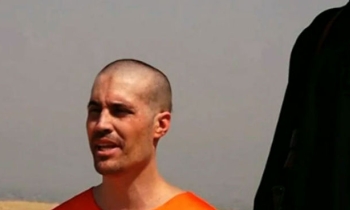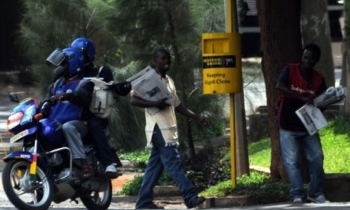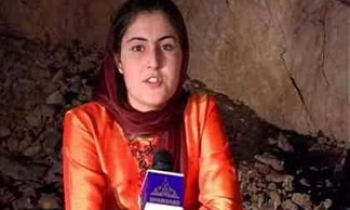BAGHDAD (Reuters) - Under Saddam Hussein, Iraqi journalists were threatened, detained, tortured and killed -- victims of a system that tightly controlled what was written about the country's Baathist leader.
The destruction of the Information Ministry -- one of the main instruments of Saddam-era censorship -- during the U.S.-led invasion to oust the Iraqi leader in March 2003 symbolically ended decades of zero press freedom.
But journalists' initial optimism that they would finally be able to report freely has been eroded. In today's democratic Iraq, they face many of the same dangers, as well as new threats.
Journalists are under intense pressure from political, ethnic and religious groups and there is a risk that interference could intensify as parties jostle for power during talks to form a new government. Reporters are also targeted by Sunni Arab insurgents and militias tied to political factions.
"Our journalists have been intimidated and harmed in many ways. They fear being killed, detained or dismissed if they criticise a party or even the government itself," said Moayad al-Lami, secretary general of the Iraqi Journalists Association.
Muntaha al-Qaisy, editor-in-chief and owner of al-Diyar newspaper in Baghdad, was targeted after she wrote about alleged random detentions by Interior Ministry forces -- allegations the ministry denies.
"Two masked men visited my offices and told me to stop writing about it. They warned me that I was endangering my son and daughter," she told Reuters.
When Qaisy ignored the threat another man visited her home and gave her what he called a final warning. "I was totally afraid, not for myself, but for my children," said Qaisy, who has since shut down her newspaper.
FLOURISHING MEDIA
Under Saddam, there were four official newspapers in Iraq. Today there are more than 160, showing the hunger for uncensored, independent news. But journalists say they increasingly find themselves caught in political crossfire.
Before, censorship was enforced by the Information Ministry. Now, there are many more players trying to control the news -- insurgents, ethnic and political factions, and the government.
Along with the U.S.-funded Iraqi Media Network, which owns al-Sabah newspaper and the public broadcaster al-Iraqiya -- seen by many Iraqis as a mouthpiece for the government of Prime Minister Ibrahim al-Jaafari -- there are also the newspapers controlled by the various political factions.
The Supreme Council for the Islamic Revolution in Iraq (SCIRI), the most powerful party in the ruling Islamist Shi'ite Alliance, has al-Bayna daily as well as al-Forat television; Jaafari's Dawa party has al-Dawa; and former prime minister Iyad Allawi has the daily Baghdad.
"There are huge pressures on Iraqi journalists from the parties' militias, which don't like being written about," said Satar Jabbar, editor-in-chief of New Bayna, another newspaper.
"The problem is how to be independent when there are these pressures. We can't stand up against any party in the government, or any powerful party, because we might be harmed or banned from working any more."
Iraq is the most dangerous place in the world for journalists. Since the March 2003 invasion, some 60 have been killed, according to the New York-based Committee to Protect Journalists media watchdog. More than 40 were Iraqi.
Sunni militants frequently target Iraqi journalists working for U.S.-backed or other foreign news outlets. As a result, many have quit their work or take great precautions not to be identified with their employers.
But journalists say they also face arrest and intimidation when they write about the government, whose ministries are controlled by different political factions.
"Many Iraqi journalists have been randomly arrested because of what they published ... We have succeeded in releasing many of our journalists through contacts with the prime minister, president or Interior Ministry," said the Iraqi Journalists Association's Lami.
WORTH THE RISK?
Media watchdog Reporters Without Borders has expressed concern at the arrests of local journalists by Iraqi authorities and U.S. military, often without proof of wrongdoing.
Some journalists have subsequently been tried and convicted on charges stemming from their work.
Two journalists in the city of Kut, southeast of Baghdad, face more than 10 years in prison on defamation charges linked to articles criticising the police and local government officials.
In the Kurdish-ruled north, writer Kamal Sayid Qadir, who also has Austrian citizenship, was sentenced to 30 years in jail in December after he was convicted of defaming Kurdistan President Masoud Barzani. His trial lasted just over an hour.
After an outcry by rights groups and the Austrian government, Kurdish officials said Qadir would be retried.
"Democracy will not work without free media," International Federation of Journalists General Secretary Aidan White told a gathering of Iraqi journalists in neighbouring Jordan last year.
Ismael Zair, editor-in-chief of New Sabah newspaper in Baghdad, knows that too, but he is no longer sure that getting the story out is worth the risk to his reporters.
"Working for the press now is a very tiresome business. Iraqi journalists work in really dangerous situations. I'm really thinking of closing this newspaper and leaving."









